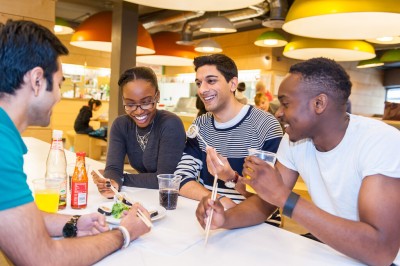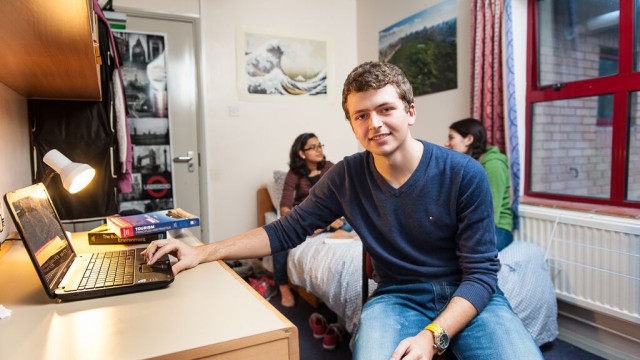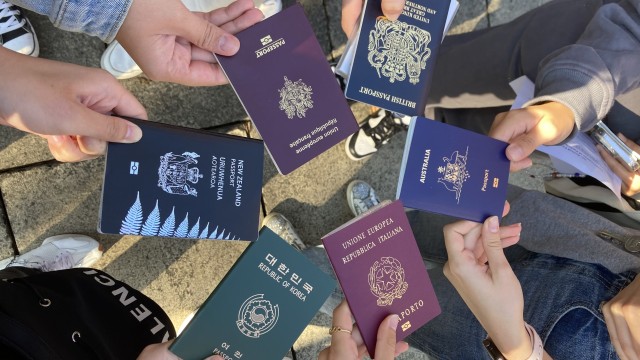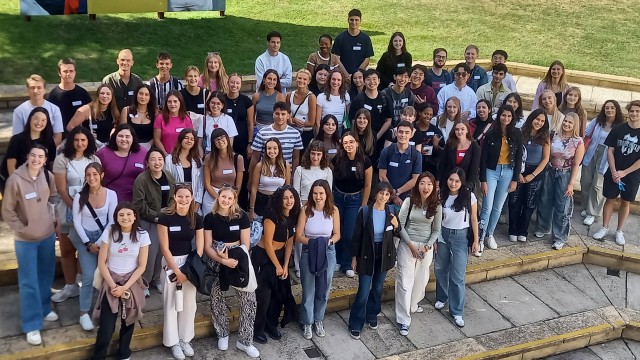

Preparing for your arrival
As an international student coming to the University of Surrey for a short exchange or study abroad stay, a research placement or traineeship, there are a number of things you must do before you travel to the UK. This section will help prepare you for your stay at Surrey and for the journey.
When to start preparing
We suggest you start preparations for your stay as early as you can to ensure that the transition from home to Surrey is an exciting and rewarding experience and to ensure that you don't miss any essential activities at the beginning of the academic year which might have a negative impact on your academic success.
Accommodation
Exchange students are eligible to apply for University accommodation. We can normally allocate rooms to all of our exchange students, but it is not guaranteed and, in years of high demand, a few may need to rent a room in the private sector.
The University of Surrey’s accommodation is grouped into self-catered ‘Courts of Residence’ on three sites:
- Stag Hill (our main campus where most academic buildings are located)
- Manor Park (our residential village, 5 minutes by bus/15 minutes on foot)
- Hazel Farm (a small residential estate 2 miles north of the main campus in north Guildford/20-30 minutes by bus - residents can purchase a discounted student bus pass).
We have two designated arrival dates, when students can move into their accommodation: the day before our Exchange Orientation in late September and in late January/early February. It is generally not possible to get most rooms ready earlier, but it may be possible for a few students to move in a day or so earlier by agreement with the Accommodation Office.
Students must vacate their room by the last date on their rental contract, which is usually the Monday morning after the end of the semester.
Student rooms can normally only be allocated for full semesters, so research project students are advised to come to Surrey for the whole semester, the start of the semester or the summer vacation period, if possible. Students coming outside the normal semester dates are advised to contact the Accommodation Office for assistance with renting in the private sector (see section below). It may be easiest to find a room to rent as a lodger in a landlord's home nearby.
Student nurses, midwives and paramedics are advised to book accommodation in Royal Surrey County Hospital keyworker flats as these are conveniently located next to the hospital and just 10 minutes by bus from the main University campus. Details of how to apply will be emailed to students once their exchange application has been accepted. The rent must be paid in full before your arrival.
Alternatively, if there is availability, it may be possible to stay in student accommodation at Manor Park, just a few minutes' walk from the hospital.
Courts are divided into blocks containing a number of flats/apartments. Each flat shares a kitchen and some share a bathroom. Ensuite rooms have their own shower and toilet. Each room has broadband and a telephone point with its own telephone number. Rent includes personal possessions insurance, broadband and telephone connection, gas, electricity and water. Bedding, towels and kitchen utensils, pans, etc. are not provided, but you can buy an inexpensive bedding pack from the university online store (including white duvet, duvet cover, sheet, pillow, pillowcase), which will be in your room when you arrive. Meal plans are also not provided – all accommodation is self-catered with a shared kitchen, and there is a large supermarket nearby as well as various food outlets and a mini-market and a weekly fruit and vegetable market on campus.
University accommodation is divided into different price bands to suit different budgets. See descriptions, virtual tours and images of the rooms in each price band.
Exchange and study abroad students must pay for their accommodation at Surrey. See here for prices and payment details.
When applying for university accommodation, students are asked to indicate their price-band order of preference. We do our best to offer students one of their top preferences, but it cannot be guaranteed.
Accommodation fees can either be paid in full or in a few instalments or you can arrange to pay in monthly instalments. All students must pay a GB£250 pre-payment to secure their room and will be invoiced via their Surrey email for the rest around the second week of teaching. You can pay for the semester in full or arrange to pay in monthly instalments. Any additional days at the start of your stay will be added to your invoice pro rata.
Our Accommodation Office provides advice and guidance on finding a property to rent in the private sector nearby. If you wish to rent privately, please visit our Privately Rented Accommodation pages for important and useful information and advice. Private rental contracts in a shared student house or a private flat are always for 6 or 12 months in the UK, whereas renting a room ('lodgings') in a private, landlord-occupied or family home can be for any length of time by agreement with the landlord, so is better for students coming for a shorter length of time.
We will email exchange students in June/November with details of how to apply for University accommodation using our online application form. The email will contain your unique Student Number, which you need in order to complete the form. You will need to indicate your preferred price bands in order of preference. You will not be able to specify a particular Court or site. If you have any special requirements, these can be entered on the form after liaising with one of our Centre for Wellbeing counsellors or a member of our Disability & Neurodiversity team. For wheelchair or mobility scooter users, Twyford Court and International House (currently under renovation) on the Stag Hill campus or Manor Park provide the most suitable accommodation and easiest access to the academic buildings on campus.
The Accommodation Office will confirm by email whether students have been allocated a room by:
Autumn/Semester 1 entry: late August/early September
Spring/Semester 2 entry: mid-December
All successful applicants will be asked to pay a GB£250 deposit to secure their room and must complete an e-induction form with their details, following which they will be emailed details of their room, flat number and block. Students should carry this email in their hand luggage when they travel to Surrey so that it can be presented at the key collection point.
Students must make a pre-payment of GB£250 to secure their room. You will then be invoiced via your Surrey email for the remainder of the semester’s rent a couple of weeks after your arrival. Fees for the spring semester are split into two instalments or you can arrange to pay monthly. Check here for the payment schedule.
Please see our Pay your tuition and accommodation fees page for how to pay.
Bedding and towels are not provided. Students coming by car can bring their own bedding/towels, but most students will need to purchase a bedding pack prior to arrival through the University’s online store. These are very reasonably priced, include a complete set of white bedding, and will be in your room when you arrive. Bedding packs do not include towels.
All rooms have broadband internet access, but if you prefer wireless access in your room, ResNet Wi-Fi access kits can be purchased through the University’s online store.
Kitchen utensils, pots and pans, etc. can be purchased at Tesco’s, a large supermarket 10 minutes’ walk from the main campus/Manor Park, or from Primark in the Friary Shopping Centre or Poundland in Guildford town centre. It is also worth checking whether any kitchen equipment has been left at your Court Reception by previous residents.
The University supports current smoke-free legislation. It is therefore illegal to smoke inside any University building. This includes your University bedroom, kitchen and common room areas.
Visas and immigration
Check whether you will need a visa to study in the UK by entering brief details into the UK Government visa checker. All UK visas are now digital rather than a stamp or paper vignette in your passport.
Holders of a valid UK or Irish passport do not need a visa to enter the UK for study and work. You also do not need an Electronic Travel Authorisation to travel to the UK.
All other students:
UK study of 6 months or less
Depending on your nationality, international students coming to study in the UK for 6 months or less (no working) will need to either:
- apply and wait for a Standard Visitor visa (currently GB£115) before travelling to the UK (the visa checker will say you need a visa). Once you have been formally accepted by Surrey, we will email you a visa support letter for your visa application. Visa processing time: usually 3 weeks but may be up to 5 weeks at busy times.
- enter the UK as a Visitor without applying for a visa (the visa checker will say you don’t need a visa). You will need to apply instead for an Electronic Travel Authorisation (ETA; from 9 April 2025: GB£16) around a week before travelling to the UK. You will also need to carry in your hand luggage the supporting documents needed for the Standard Visitor visa whenever you travel into the UK whilst studying here. Once you have been formally accepted by Surrey, we will email you a formal acceptance letter to show at UK border control.
UK study of more than 6 months or study AND work for 6 months or less
International students coming to study in the UK for more than 6 months (i.e. two semesters) or wishing to work as well as study (including paid work, voluntary work, work experience, work placements or internships outside your Surrey course), will need to apply and wait for a Student visa (currently GB£490) before travelling to the UK. As part of the visa application, you will also need to pay the immigration healthcare surcharge, which entitles you to treatment under the UK’s National Health Service (NHS) on the same basis as UK residents. Non-native English speakers are required to submit one of the University's accepted English language qualifications with their exchange or study abroad application to Surrey to show they meet the minimum level of competence in English required for their particular Surrey course (see 'Entry Requirements' in undergraduate courses / postgraduate courses).
Once you have been formally accepted by Surrey, the University will email you a Confirmation of Acceptance for Studies (CAS) number for your visa application. Some nationals may be required to attend an appointment at your nearest visa application centre to provide your photo, fingerprints and supporting documents. Visa processing time: around 3 weeks (from date of appointment).
You may work in the UK (paid, unpaid or internship) for up to 20 hours a week during university teaching periods and full-time during university vacations whilst you are studying here.
Academic Technology Approval Scheme
To study or research certain sensitive subjects, postgraduate students may need an Academic Technology Approval Scheme (ATAS) certificate. We will let you know if you do. You need to apply for the ATAS certificate before starting your course or placement. Processing time: up to 6 weeks.
Further information and advice
For further information about visas and the supporting documents you need to provide, see
- UKCISA’s student visas and immigration information
- University of Surrey’s visa guidance.
For advice regarding visas, please contact the University’s International Student Advice team on internationalsupport@surrey.ac.uk.
As a Student Visa sponsor, the University of Surrey is responsible for monitoring students and their attendance at classes during their studies.
The University has a duty to report to UK Visas & Immigration if you fail to arrive for the start of the course, withdraw from a course, defer or suspend your studies, complete your course before the expected end date or fail to attend without authorisation from your Faculty. This may lead to your visa being curtailed. You must therefore keep in touch with your Faculty, the Visa Compliance team and the International Student Office at all times, particularly if you encounter any problems before or during your studies.
Booking travel
Please note the exchange arrival and departure dates when booking your travel.
If you will be taking exams at Surrey, please do not book your return/onward travel for before the end of the exam period, which is the evening of the last day of the semester. Exam timetables are released a month before the start of the exam period. Also, please be aware that unusually heavy spring snowfall can result in examinations being postponed!
Erasmus students taking assignment-only modules should note that the minimum stay to be eligible for Erasmus+ study exchange funding is 2 months and you will only receive Erasmus funding for the days you are physically present at the University of Surrey.
On the exchange arrival day in September and February, exchange and study abroad students can sign up to be met by our student helpers and collected by minibus from Guildford railway station after their arrival by coach from London Heathrow airport or by train from London Gatwick airport or London Waterloo station in central London. You can sign up a month or so before your arrival here. NB. Students flying to the UK will need your flight details to complete the form.
Follow the link above for information on travelling to the University independently.
Money matters
The University does not have any bursaries or scholarships for exchange or study abroad students, and it will not be able to help fund your stay. However, Surrey is a member of BUTEX and so students coming to study at Surrey can enter a competition to win a GB£600 BUTEX Scholarship.
Students with a Student visa can work for up to 20 hours a week during teaching periods and full-time during university vacations (see UK national minimum wages). Standard Visitor visa-holders and Visitors without a visa are not allowed to work whilst studying in the UK (paid, unpaid, internship or work placement outside your course).
Students applying for a visa will need to provide evidence that they have sufficient funds for their stay, currently estimated at £1,136 a month. Students who don't need a visa are advised to carry evidence of sufficient funds to cover their living costs each time they enter the UK.
You should pay for things in the UK in UK currency (pounds sterling) whenever possible as you will need to make up for any shortfall arising from currency fluctuations or bank transfer charges. Allow for any increases in exchange rates which may affect your living costs.
Check with your own bank about requirements for transferring funds well before you are due to travel. If you need written evidence from the University concerning your admission, registration or your estimated expenses, you should obtain this from the International Engagement Office.
Fluctuating exchange rates can make a big difference so try to change your money at the right time but make sure this does not cause you to miss important payment deadlines. Your sponsor or family will be able to transfer funds into your bank account directly. There may be charges for this and for currency conversion.
Most taxis, public transport, shops and leisure services in the UK now accept bank cards or banking app payments, and the University of Surrey campus is virtually cash-free, so you are advised to only bring a small amount of UK sterling cash with you for expenses at the airport, travel to the campus and initial living costs, just in case you have problems with your bank card in your first week. Lifestyles vary, but you should not need more than GB£200-300.
Your bank may charge you for each transaction you make in the UK, so before you leave home, find out about your bank's currency conversion fees and money transfer fees for when you are in the UK. Visiting students are generally not able to open an account at a UK high street bank but it may well be worth setting up a digital/online bank account and transferring funds before you leave home to cover your living costs and accommodation and avoid currency conversion fees.
Students applying for a visa will need to show that you have enough money to cover living costs (including accommodation) of GB£1,136 per month for the duration of your stay. This is considered by the UK government to be the average amount a student living outside London needs to support themselves.
You will need to budget carefully to cover all your living costs, which include accommodation, clothes, transport, books, food and entertainment, plus your flight to the UK. Although UK Visas and Immigration has specific financial requirements for visa applications, it is very difficult to estimate how much money you will spend in a semester or year as it depends on your lifestyle and circumstances. The University of Surrey estimates that you will need at least GB£250 per week to cover your general living expenses, including rent.
Remember, you will need to spend more money at the beginning of the programme as you will need to buy one-off items such as bedding, kitchen equipment and books. You may also have to spend more if you are studying on certain programmes where you may need to buy special equipment. Small charges may be made by some departments for supplementary materials or services.
University accommodation is usually cheaper than living off campus as the rent includes utilities, heating, lighting, internet connection and contents insurance. For a full breakdown of costs, please see our accommodation prices. Please check your accommodation allocation letter when budgeting for your living expenses to see how much your rent will be.
The Student Budget Calculator is a useful tool for helping you to evaluate approximate costs of living in the UK. You can also refer to our budgeting page for approximate living costs.
- Self-catering is cheaper than eating out. Making your own lunch, buying food from the local supermarket and looking out for ‘own brands’ (products made by the supermarkets themselves) and bargains help to save money
- Try shopping and cooking with friends as this is cheaper than cooking for one
- University housing includes water, heating, electricity and broadband bills so you have no surprises at the end of the month
- Consider pay-as-you-go mobile phone services instead of long contracts you may not need
- Wait until you start your programme before buying books – you may be able to buy second hand books or use the library in some cases - most papers and books on our reading lists are available online from the library
- Take advantage of student discounts – you may be able to get reduced-price tickets at the cinema, art exhibitions, in shops, and hairdressers
- Consider buying a second-hand bicycle if you are going to live off the main campus
- Use international telephone cards (available on campus) to make cheaper calls home or use free internet services such as Skype or Whatsapp
- You do not have to buy expensive bottled water – tap water is drinkable in the UK and there are water bottle refill stations in a number of buildings around campus
- Visit the campus fruit and vegetable market on a Thursday for a variety of produce at reasonable prices.
Insurance and Healthcare
All students should take out travel insurance with health cover before travelling to the UK. EU students should check here whether they need to apply for a new European Health Insurance Card in their country before coming to the UK in order to get some free or reduced-cost health treatment. Students who travel to another country for a holiday during their studies in the UK must take out additional travel insurance.
All students living in University accommodation are covered by personal possessions insurance (up to £4,000) and laptop insurance (up to £2,000), but can extend the cover for an additional fee to include mobile phones outside your room and other benefits. Students living in private-sector accommodation will need to find out whether personal possessions insurance is included in their rent.
Registering with a doctor
The University has a Student Health Centre, Guildowns Group Practice, on the main campus and there are a number of doctors' surgeries (or 'GPs' as they are called in the UK) a short walk from campus - for details of these and other health services, see My Surrey.
The Royal Surrey County Hospital is 5 minutes by bus from the main campus and next to the Manor Park residences. It has an Accident & Emergency department, open 24/7.
Details of who is entitled to free treatment under the UK’s National Health Service (the NHS) are available on the UKCISA website. The following NHS treatment is free for everyone:
• emergency hospital treatment (but not follow-up treatment)
• family planning services
• diagnosis and treatment of certain communicable diseases
• compulsory psychiatric treatment
Most international students studying at Surrey for more than 6 months will have paid the immigration healthcare surcharge with their Student visa application. This entitles you to the same free UK National Health Service (NHS) healthcare as a UK citizen, but excludes prescriptions, eye tests, glasses and dental treatment. Even if you have paid the healthcare surcharge you may need some health cover with your travel insurance. Prescription costs can be found on the NHS website. You should register with your nearest GP in your first week at Surrey - see NHS choices website.
International students studying at Surrey for less than 6 months will not be covered by the NHS, except for the free services listed above, and students from countries with a reciprocal health agreement with the UK are unlikely to have full health and repatriation cover, so you must take out private health insurance. If you fall ill or need treatment during your stay, you should phone your nearest GP to book an appointment (see NHS choices website) and register as a temporary private patient. The treatment charges will be available from the GP reception.
European Health Insurance Card
EU/EEA students should check here whether you need to apply for a new European Health Insurance Card in your country in order to be eligible for free or reduced-cost treatment in the UK. Even with a card, you will still need to take out travel insurance with some health cover.
Ongoing Medical Issues
If you have any pre-existing medical issues that may require treatment or medicines during your stay, please fix an appointment at your nearest GP as soon as possible, so that appropriate arrangements can be made for your support. In particular, the doctor would need to know about any important ongoing problems such as diabetes, heart disease, high blood pressure, mental health problems, etc. You should bring with you any medical notes you have concerning your condition, together with enough medication for at least the first month.
Medicines and prescriptions
Pharmacies (also known as 'chemists' in the UK) are also a useful source of information and can provide basic medications for minor illnesses such as colds, coughs or hay fever. Over-the-counter medicines may also be cheaper than prescription medication. There are several local pharmacies near the University. If your symptoms persist, you should make an appointment to see a doctor. You can also call NHS Direct for help and advice by simply dialling 111 at any time or visiting their website.
The University has a Centre for Wellbeing, which provides counselling and emotional support for a wide range of personal issues and mental health problems, as well as family planning services. The Centre offers 20-minute drop-in sessions or you can arrange a longer session by telephoning 01483 689498 or emailing centreforwellbeing@surrey.ac.uk.
Orientation
The Erasmus/Exchange Orientation is your introduction to your study exchange at the University of Surrey and will provide practical and academic information, as well as being a great opportunity to meet other exchange students and see something of the local area before your studies begin. The 2-day Orientation is compulsory for all exchange students, apart from Nursing placement students who will be emailed a separate orientation programme.
You will be emailed a link to the orientation programme.
The week following the September Exchange Orientation is ‘Welcome Week’. The Welcome Week events programme is designed to help all new students get to know the University and their Faculty. It is an opportunity to meet other students on your programme, to find out about the social and sporting activities on offer, and covers all the information that you need to know to get started on your course and get the most out of your stay at Surrey.
Welcome Week events start on the Sunday after your Erasmus/Exchange Orientation, with receptions for all new students in each Accommodation Court.
The University’s Welcome website will become live in mid-August and will provide you with full information on how to complete the first part of the university registration process online whilst still in your home country, as well as helping you to prepare for your arrival at Surrey. It also contains your full exchange student timetable for Welcome Week (September only). We will email you a reminder to download or print off your timetable.
Buddy network

The University’s International Engagement Office manages a Buddy Network to enable new exchange, study abroad and placement students to meet each other and current Surrey students who have returned from studying or a work placement abroad. The aim of the Buddy Network is to enable you to ask any questions you have and help you to make friends, settle in and get to know the campus and your new local environment quickly. You may even be able to arrange to travel to Surrey with other students coming from your country.
The International Engagement Office will invite you to join our Exchange and Study Abroad WhatsApp group before you arrive. This group is managed entirely by our Surrey students or 'buddies' who have returned from abroad.
We will also provide opportunities for you to meet each other during your orientation and during your stay. We recommend you arrange to meet up for social activities via the WhatsApp group.








